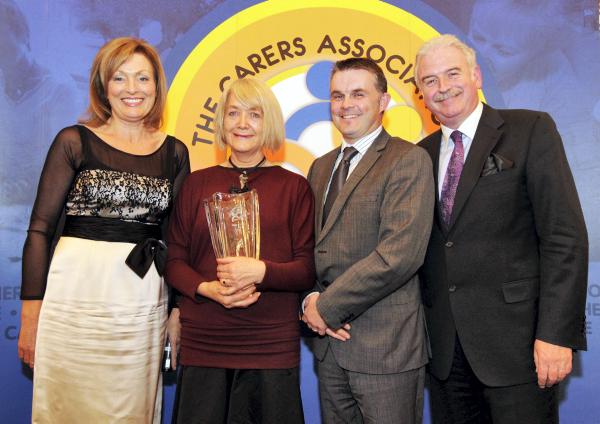I’ve heard of people saying you are tested in life and I thought I could stand up to that if it came. But I never thought it would come in such a hard way.”
Ann Curtin (70) never imagined she would become one of Ireland’s 187,122 family carers, never mind win Carer of the Year, yet the Limerick woman was thrust into what she calls “the silent role” following not only her husband Michael’s stroke, but a devastating accident which left her youngest son, Andrew (30), in a wheelchair, having already battled depression since the age of 19.
Meeting in advance of National Carer’s Week, which runs from 9 to 15 June, the mother-of-four describes how the family’s life was shattered when Andrew first presented with depression, initially attributed to anxiety caused by starting college. While receiving treatment in hospital, however, the family received a double blow when Michael suffered a stroke.
“It happened late at night and it was quite traumatic,” says Ann. “I remember vividly because my son was in hospital with depression, so it compounded this awfulness. I ended up with the two of them in different parts of the regional hospital for the next three months.”
While Michael recovered slowly, Andrew also appeared to turn a corner, completing a master’s and exploring a media career.
“He achieved a lot,” says Ann.
“He was quite brave in the way he dealt with his depression, but he relapsed when we thought he was at a good phase in his life and it meant him having to go back into hospital.”
Unfortunately, further tragedy followed in September 2011 when Andrew suffered a spinal injury as a result of a fall, leaving him in a wheelchair. As he spent the next nine months in hospitals in Dublin, Ann lost two stone due to the stress of trying to keep everything together.
“You are prepared for a lot of things,” she says, “but you’re here now with a double tragedy. I cried on trains and mopped my face up before I got to the hospital and put on the brave face. Funnily enough, it works, because if you see somebody waiting to see you with a smile, you say: ‘If he can do it, I can too.’”
Ann compliments Andrew’s inspiring attitude, which saw him eventually discharged from the National Rehabilitation Hospital in Dun Laoghaire in June 2012. Since then, she has juggled the responsibility of being primary carer for both her husband and son; the maximum weekly allowance for somebody over 66 caring for two people is currently set at €358.50. Ann does receive home help to assist with tasks like showering, and last summer the family finally moved in to an adapted house suitable for Andrew’s needs.
However, there are still challenges: for example, Andrew is on a waiting list for an electric wheelchair, while in the last year, Ann has paid €7,500 in physiotherapy bills, only offset when her son and a friend raised €2,000 through a sponsored run.
What weighs more heavily, though, is the emotional burden. Although Andrew has battled bravely, he recently had to return to hospital for treatment for depression.
While Ann remains hopeful for the future, the uncertainty can be overwhelming.
“Even though I come from a family that I view as fighters, in my dark moments I do find it hard to come to terms with,” she admits.
“People come to me and they mean well and they say things like, ‘Oh you’re looking great’ and ‘I saw you yesterday and you were in great form,’ and they might not know that I could have been shedding tears that morning. You pull yourself together and put on the brave face. And I’m sure I’m speaking for loads of other people who do the same.”
Winning Carer of the Year – for which she was nominated by Andrew – came as a huge boost.
“I was so moved by my son nominating me. We met with all the carers from all over Ireland and through speaking with them I know that they are going through the same journey as I am, in different ways.”
Ann believes that carers need a place where they can meet regularly to share their concerns, and have easy access to respite to allow a day or even an evening off to recharge. While family and friends have been a huge support, the patient – or patients, in her case – are the prime concern and the carer often takes on a silent role.
Yet, while Ann does not know what the future will hold, she is sure of one thing: “I have realised my strengths,” she says.
“You can plumb the well of resilience deeper than you thought.”






 This is a subscriber-only article
This is a subscriber-only article





SHARING OPTIONS: